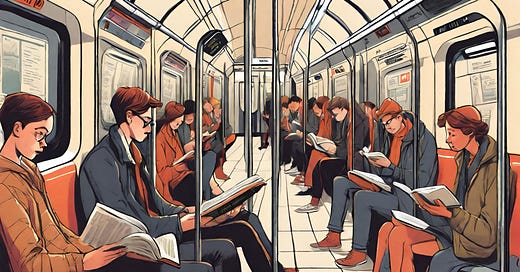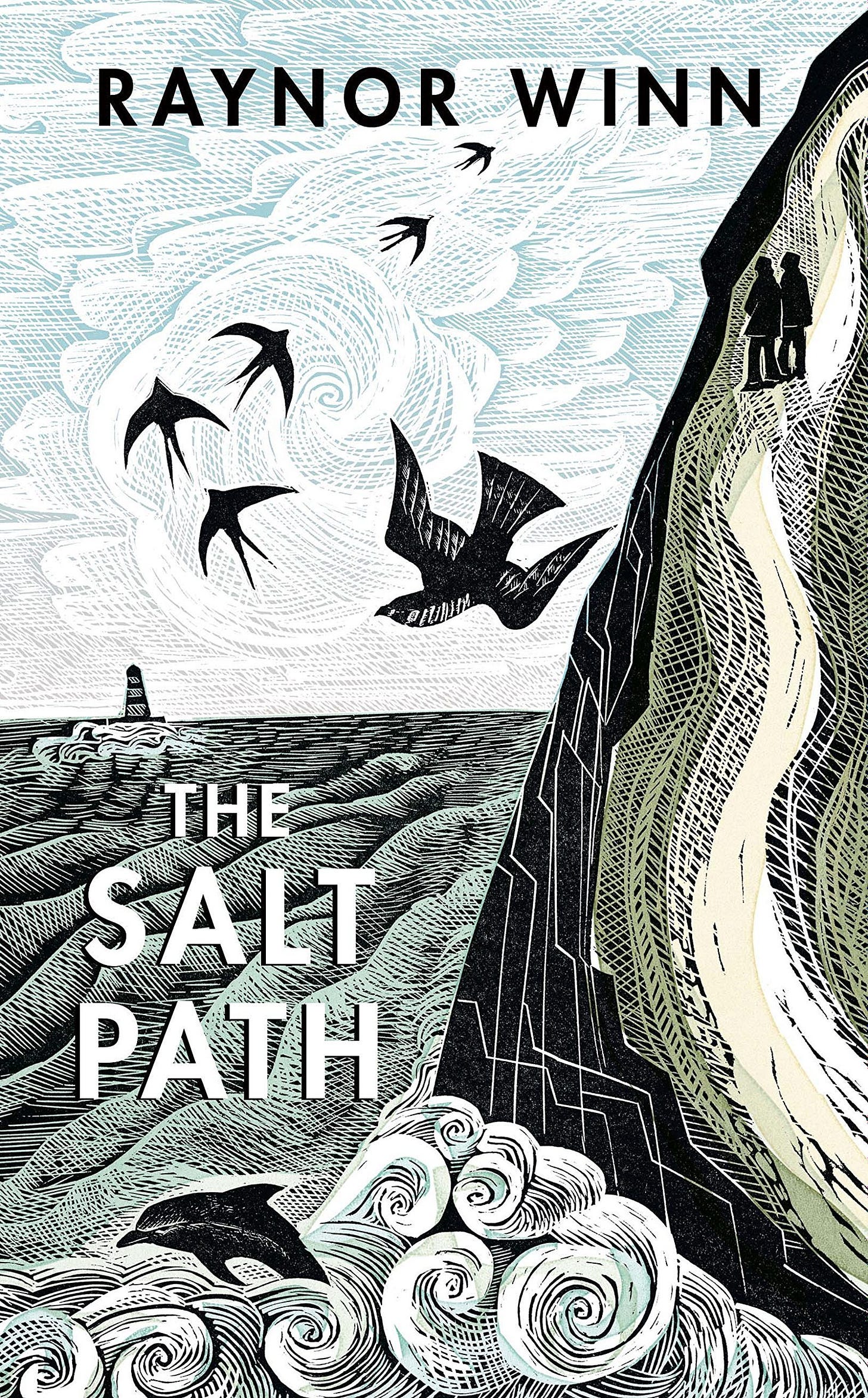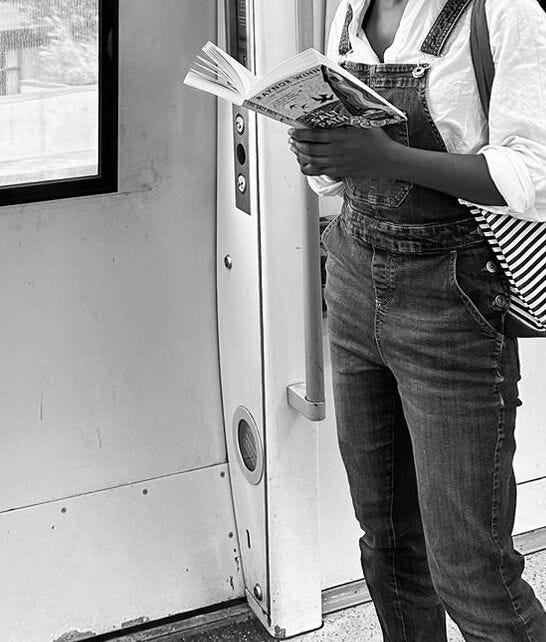If you read my Initial Thoughts about the #30TubeReads, you know that I was pleased this challenge would force me to pick up books out of my comfort zone. This is an example of just that.
Let me talk about the book in question: Raynor Winn’s The Salt Path. (Mostly because I feel guilty for not enjoying the reading process.) Right at the beginning, the book attempts to tug at the reader’s heartstrings. You are forced to admit that life has dealt them multiple hard blows. Winn and her husband, Moth, lose their home and business, their sole source of income, after losing a court case about an unfortunate business investment. As they are still reeling from that shock, Moth’s persistent arm and shoulder pains are diagnosed as a degenerative disease. Winn’s writing shines when describing the heartbreak that comes with the knowledge that she would soon lose her partner of over 20 years to dementia. Only the quietly heartbreaking moments of the love story between husband and wife kept me reading. However, Winn’s writing is also meant to arouse sympathy for their circumstances. Still, something about her repetitive, vague description misses the mark.
At last I understood what homelessness had done for me. It had taken every material thing that I had and left me stripped bare, a blank page at the end of a partly written book. It had also given me a choice, either to leave that page blank or to keep writing the story with hope. I chose hope.
In this moment of bleak hopelessness, Winn and Moth realise they have no other option but to live on the sofas and kindness of their friends and relatives for the foreseeable future. Even after doing everything right for their entire lives, they were homeless, with only Moth’s pension to support them. I would have rolled my eyes at the solution they came up with if this was not a book based on a true story because the couple decided to pack their mere belongings in two rucksacks and go on a walk down the South West Coast Path. Why? I get why escaping from their life could seem like a good idea. I also find some merit in the argument that the walk was something they could do independently when they had no control over any other aspect of their life. But you would imagine that after a degenerative disease diagnosis, they’d want to take a chill pill instead of embarking on a challenging walk and a life of wild camping. Maybe I am just lazy and like modern plumbing a little too much!
It’s touched you, it’s written all over you: you’ve felt the hand of nature. It won’t ever leave you now; you’re salted...People fight the elements, the weather, especially here, but when it’s touched you, when you let it be, you’re never the same again. Good luck, wherever your path takes you.
I am not an outdoorsy person. I’m the kind of person who prefers to carry cans of premixed alcohol and speakers blasting music on every hike. And most importantly, I like being back in the comfort of my home before sunset. So, to begin with, I found it difficult to get on board with the couple’s bright idea based on a book that Winn had once read about a 20-year-old who had done the same walk with his dog. Then, the descriptions began. I like my fair share of poetic descriptions of nature, but when that’s all you get for page after page, you start questioning when it will stop. I tried skimming pages to get to the plot, but after a point, I was not even glancing. I was flipping the pages. Winn’s choice of words is beautiful, but there were too many words, and I would have done better with a stricter editor.
Does it take a time of crisis for us to see the plight of the homeless? Must they be escaping a war zone to be in need? As a people, can we only respond to need if we perceive it to be valid?
In brief breaks between the descriptions of nature and their arduous journey, Winn explores what it means to be homeless. She debunks the misconception that homelessness is a choice; sometimes, it is about the cards dealt to the person. However, Winn attempts to categorise the kinds of homelessness. She constantly looks down on homeless people battling addictions and attempts to distance herself and her husband from ‘that kind of homelessness’. It gets heavy-handed and annoying after the second time she mentions it. I expected the exploration of this social problem to be a little more nuanced, especially since it was finally a part of the book that really sparked my interest.
Our hair was fried and falling out, our nails broken, clothes worn to a thread, but we were alive. Not just breathing through the thirty thousand or so days between life and death, but knowing each minute as it passed, swirling around in an exploration of time.
However, it was unfair of me to expect that from the book. At its core, Winn has written a travelogue, which is not my cup of tea. Additionally, there must be more reason to root for the main couple after the first few chapters. Even the heart-wrenching descriptions of their hunger and trying to make every penny stretch got so repetitive after a point that I could not feel for them anymore. But I could not think for them… As a third-person reader… Why weren’t their kids and friends concerned? I kept getting pulled out of the story because every time the couple was met with a new hurdle, it made me question, with a certain amount of disbelief, why the kids were not constantly in touch with their parents as they embarked on the walk. My Indian upbringing could never!
If we hadn’t done this there’d always have been things we wouldn’t have known, a part of ourselves we wouldn’t have found, resilience we didn’t know we had.
There are some moments in the book, however, that are fun to read. The moment when the seagull snatched a dear piece of pastry hit so close to home. My Brighton traumas were triggered! There were also moments of unexpected laughter as Winn described her encounters with morning dog walkers as she attended her nature’s call several consecutive mornings. How Moth grow stronger and more agile as they cover more ground on the walk was an interesting take on the limitations a diagnosis can impose on a person. The resilience that this book is meant to be about feels highlighted only in these scenes.
There was quite a lot of the book that I was bored by. But the one thing that was consistently interesting to read was the reactions they were met with from other walkers. Winn complains about how she is mistaken for older than her age; she is in her 50s, and the change in people’s reactions every time she reveals that they are homeless. The shift from the envious glances they receive when the people they meet find out that their aim is to finish the entire path to the looks of distrust and disapproval when they find out the truth highlights the biases that exist in society.
Most people go through their whole lives without answering their own questions: What am I, what do I have within me? The big stuff. What a waste.
The book does pick up pace towards the end, but by the end, I was just waiting to be done with it. It is meant to be a motivating read about the resilience of humans, but it did not manage to do that for me. By the end, I felt cold-hearted because the book failed to move me as much as it clearly did for the hundreds of readers who gave it an exceptional rating on Goodreads.
I’m not a reader of travelogues so I cannot give recommendations to that effect. But I did go through a phase of reading ‘Motivating Books’. (The capitalisation feels necessary.) Several websites recommended The Salt Path as a book for those who enjoyed Cheryl Strayed’s Wild. I think reading the latter is a much more enjoyable experience overall. Educated by Tara Westover was a book that successfully explored the resilience of humans. This might be a controversial opinion, but I thought The Four Winds by Kristin Hannah was an easy read about a complex topic. A good book that discusses the idea of homelessness and displacement from the perspective of refugees is Placeless People: Writings, Rights and Refugees by Lyndsey Stonebridge.
That’s my second review for #30TubeReads! I wonder if the person I saw reading this had more patience than me and was part of the majority that enjoyed the book or was just as bored. Either way, I would not have picked this one if it hadn’t been for her!





